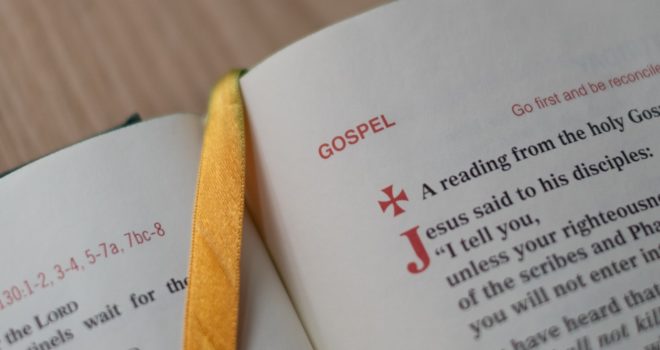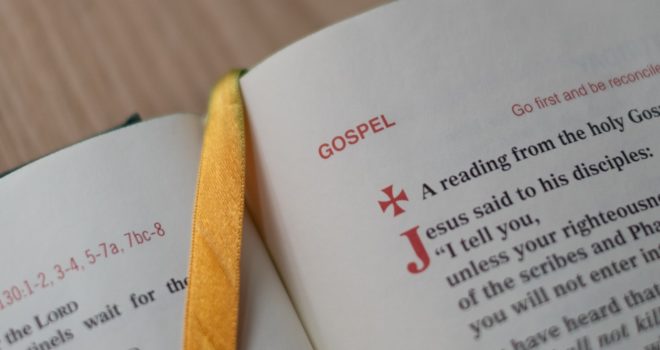This is the ninth and final article in a nine-part series entitled “Evidence for Agnostics.” New articles in the series will be published each Monday.
Being skeptical about a conclusive statement until the evidence is reviewed and analyzed is both rational and fair. For accepting a conclusion without such an analysis and review is lazy and meaningless, irrational and irresponsible, superficial and immature. For such willful gullibility and passivity belies the responsibility each of us must embrace, when it comes to life and living. It is wrong to just accept what we are told without properly reflecting on what it is we are told to accept or believe.
That responsibility to reflect on and review any conclusion offered as a fact or as truth, is just common sense, a rational necessity and dictum, a manifestation of cautious skepticism we all do or should follow. And, in this we are all, at one time or another, guardedly skeptical, just like some agnostics are about God, truth, morality and the meaning and purpose of life and the universe.
Despite the inherent natural cautions, agnostics generally are reluctant to seriously consider the possibility of the existence of God and its many concomitant implications. For the natural skepticism and the responsible rationality essential to discovering profound and essential truths about life and living, they often ignore, oppose and distort. And, such agnostics fall into three basic categories.
First, there are the “lazy” reflectors who often assert the absence of any real physical evidence for the existence of God. These passive or “lazy” agnostics often argue that modern science has not found any evidence proving the existence of God. Therefore, the absence of scientific evidence proves God does not exist. For them, the absence of physical evidence for God’s existence proves God doesn’t exist.
But the nature of God, as most monotheistic religions assert and Catholicism maintains in deep doctrinal detail based on reason and revelation, is that God is immaterial and eternal, intangible and outside of time and space. That is why Catholic doctrine and apologetics use scientific knowledge to demonstrate the necessity for His existence, His nature and His activity.
The primary evidence for God’s existence is the existence of everything.
It is a scientific certainty and a rational necessity that something cannot come from nothing. The cosmos and all that it is cannot come from a spontaneous generation from absolute nothingness. That is both unscientific and irrational. For every effect must be preceded by a prior cause. The cosmos is an effect of massive scale and of intricate complexity.
Yet, this irrational fact and unscientific conclusion leads inevitably to the second group of agnostics – the scientific “double downers.” For these agnostics respond to such rational and scientific criticisms with more sophisticated scientific evidence and appeals to unverifiable scientific hypotheses. Two such possibilities are the multi-verse theory of the cosmos and the infinite regression of causation of our cosmos. Both of these ideas are unprovable scientifically and rationally because they are outside of direct empirical investigations and are merely faulty rational extrapolations of a fundamental commitment to the philosophy of scientific materialism.
From the “double downers” comes the third category – the “prejudicial” agnostics. With them, the relentless retreat of agnostics in the face of the reality of rational rigor in science and logic leads inevitably to the fears and biases about God and religion, morality and truth. For they are often fearful about the encroachment of religion on their personal freedoms and political and cultural beliefs. For example, these “prejudicial” agnostics often manifest their bias by criticizing the inconsistencies and moral lapses of Christians and their organizations.
In our modern moment, such “prejudicial” agnostics oddly accuse the people of God of intolerance and judgmental attitudes because such agnostics have failed to understand the very nature of truth and its many moral implications. Yet, these “prejudicial” agnostics do not hesitate to judge us in starker tones, despite the fact that they deny the inherent truth of sin and the moral necessity of forgiveness, which are endemic to God’s very character and His redemptive plan for humanity. Beneath the surface of these objections and accusations lurks a deep motive and concern for the exercise of their personal freedom without the unsettling specter of moral truth and objective ethical judgement.
These three broad categories of agnostics consistently avoid two crucial facts and insights. First, they ignore or deny the substance and power of reason. And secondly, they deny the inevitable implications of their reliance on scientific materialism and all that implies and means. For these two errors are so foundational to their worldview that their agnostic philosophy falls apart by virtue of its own assertions.
In essence, it is dead on arrival. And, if the debate about the existence of God was couched in a metaphoric manner as a game of chess, it would be checkmate in two moves. It is that certain. That inevitable. That fatal, based on the very nature of science and the reality of reason and its intangible nature, order and power. Based on the implications of their own assertions of scientific materialism. In the end, they are “hoisted on their own petard,” as the old saying goes.
While earlier articles in this series have dealt with these arguments in detail, a quick review can reveal the essence of these agnostic errors and their fatal flaws. Simply, they misunderstand the very nature of science. For they think of science as a unitary form of inquiry, rather than the necessary composite nature of all scientific investigation. For science is not the bottom line even in science. Reason is.
The conduct of science relies on reason as it is applied to physical phenomenon. Hypothesis development, experimental methodology, data analysis, conclusions, replications and review are all inherently rational processes. Processes that must meet the demands of rationality, of logic, as applied to physical phenomenon that is directly observable or indirectly inferred by prior scientific information. So, science employs inductive reason based on experimental data and deductive reason applied across all the phases of empirical investigation.
Most agnostics have no problem up to that point. But, the use of reason in all its forms also needs an explanation. For it is an intangible order of profound power, even in the conduct of science. And, that intangible order and power requires an explanation for its existence, its order, its power. How is such an intangible and ubiquitous order and power explainable? And, how is such an order and power possible, if everything must be physical, as agnostic’s claim implicitly in their reliance on science and explicitly in their doubt or denial of God?
For it is just here that their belief in scientific materialism buries them and their worldview. If reason’s intangible order and power is so ubiquitous in science and also in mathematics, how can reason’s nature and power be explained if everything is matter and energy. If everything is reduced to physicality. When all thinking is merely neural biochemistry, then reason is too.
And, how can distinctions between illogical and logical thinking without an appeal to an intangible order to reason and logic be even possible if all we are is biochemistry? How can we, how can they determine such errors in science or math without an appeal to the order of logic and rationality that is intangible?
The existence, order and power of reason must be explained just to prove the validity of science, its methods and its findings. And, that puts an honest agnostic, particularly the “double downers,” between a rock and a hard place. And, like it or not, it is truly fool’s mate. Game over.
Notice in the preceding discussion that skepticism is necessary to a degree, but never as a conclusion as many agnostics assert when it comes to the existence of God. Being honestly curious, but guardedly skeptical is how truth may be found. Truth about the physical universe. And, truth about God and the cosmos, truth about human consciousness and the human conscience.
The truth about God’s existence opens up the possibility that this God has made ways for us to know, to know many things. Reason, its order and power, its ubiquity and applicability, is primary evidence of God’s existence. But, it is also primary evidence of His nature and plan, just as it is primary evidence of human nature in its fulness. Evidence of love and beauty. Meaning and purpose. Virtue and vice. Law and order.
While all this may seem like a faith, it is not a blind leap nor a belief that creates a reality we might desire or hope for. Rather, faith in God, belief in God is truly a function of evidence. The evidence of reason and science. The evidence of love and truth. For belief in God is an act of our will. But, this act of will is informed and compelled by incisive and extensive evidence. It is neither blind, nor delusional.
And, the depth and breadth of this evidence is the basis for our act of free will, just as it is for our deeper curiosities and questions. For such is the nature of our free will. A will that is never compelled. A will that is never coerced. A will that can only be given freely. For true intimacy and love must come freely. And, that is how God wants us to love others and to love Him.
For love is not biochemistry. It is another intangible reality of our very nature and of our daily life and living. It is the pinnacle and purpose of all that we are and all that we do. And, it is our ultimate destination and fulfillment. To love God and to love others. Completely and perfectly. Immediately and eternally.
✠
Photo by Josh Applegate on Unsplash












